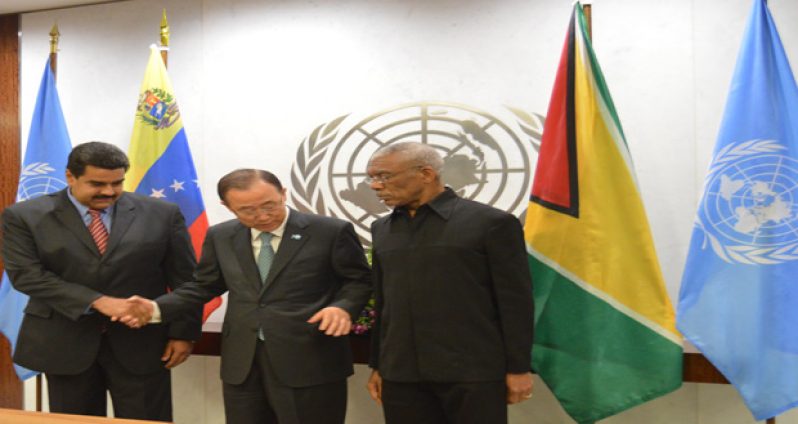The Venezuelan President Nicolas Maduro has committed himself to restoring normal diplomatic relations with Guyana following a meeting with the United Nations Secretary General Ban Ki Moon and President David Granger.
“In the case of Venezuela we will be returning our ambassador immediately to the Co-operative Republic of Guyana,” Maduro told Venezuela state said after the meeting. He also agreed to accredit Guyana’s new Ambassador to Caracas Cheryl Miles.
“Venezuela has been calling publicly and in the meeting for dialogue between the two sides. What the President David Granger) pointed out to them is that if you want dialogue, then you expect to put in place the mechanisms for dialogue, which are the Ambassadors,” Foreign Affairs Minister Carl Greenidge said.
During the meeting, President Granger did not directly address his concerns to Maduro but to the UN Secretary General. President Granger had insisted that he was not having a bilateral meeting with Maduro; rather, he was meeting with UN Secretary General “in the presence” of Maduro.
For the press, the two Presidents did not shake hands, but the UN Secretary General tried to ease the tension by joining their hands together for a photo. The Venezuelan President described the meeting as “tense and difficult” and Guyana’s Foreign Minister described the mood of the meeting as “somber” and “serious.”
“We can speak to Venezuela anytime, and once the Ambassadors are in place, normal diplomatic discussions will take place,” Minister Greenidge.
Maduro recalled Ambassador Reina Margarita Arratia Diaz from Georgetown in July when he wanted American oil firm Exxon Mobil to halt its exploration for oil and leave the area.
The Venezuelan government contends that the 1899 Arbitral Award that settled the countries’ borders is null and void, and an agreement signed in Genevea in 1966, gave the UN Secretary General the mandate to resolve the claim.
President Granger told reporters that during their meeting with the UN Secretary General, Maduro provided no evidence to back up his claim that the award is null and void.
“The Venezuelans were unable to provide any evidence that the 1899 award was void, that it was null.
“We, on our side, the Guyana side, we felt that the controversy was essentially a legal one and we asked for a legal solution.
“So the Venezuelans really had no case,” President Granger said.
Maduro agreed to accept a UN team to investigate its claim that the award is null and void, but he wants a continuation of the UN Good Officers process, in which the Secretary General appoints a mediator to determine a settlement of the issue.
But Guyana s fed up with the Good Officers process, with President Granger saying that after 50 years and successive Good Officers, the controversy remains unsettled. The President believes the time is over for that process and it is now time for a legal settlement at the International Court of Justice in The Hague.
“We took the opportunity to reiterate that we must have a juridical settlement; it’s a legal problem, there must be a legal solution,” President Granger said after the meeting last evening.
Minister Greenidge said that in the 50 years of the Good Officers process, the UN has not addressed the central point of the Geneva agreement, namely Venezuela’s claim that the 1899 award is null and void.
“None of the work of the UN has addressed that problem,” Minister Greenidge said, pointing out that in dealing with an internationally accepted legal decision (the arbitral award), “evidence needs to be presented.”



.jpg)









